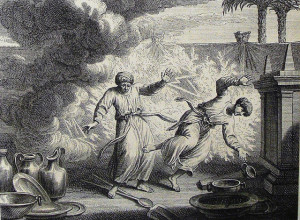Covenants especially when entered into by God are articles of faith, faithfulness, fidelity, trust and love. They are about relationships bordering on marriages; as He said of Israel: [1]Jeremiah 2:2
“Go and cry in the ears of Jerusalem, saying, Thus saith the LORD; I remember thee, the kindness of thy youth, the love of thine espousals, when thou wentest after me in the wilderness, in a land that was not sown.”

The cord that holds His covenants is love hence, however stretched, it hardly ever snaps. Much of God’s relationship with all He made, both humans and animals are thus sealed and I’m yet to find one that He broke.
The first recorded covenant with Noah is generally believed to include all nations as the Bible says we are all descended from him. It’s also generally accepted that the Noachide covenant remains operative. Irrespective of the monotheistic faith you profess, it’s still forbidden to shed blood and the rainbow still maintains the same folkloric symbolism. God has since entered into countless covenants with individuals (Abraham, Isaac, Jacob, Davidic monarchy etc), families (Aaronic Priesthood, Rechabites) [2]Jeremiah 35 and nations (Israel first at Sinai [3]Exodus 20 and then in the land of Moab [4]Deuteronomy 29 with several renewals and the promise of new ones through the prophets). None of the latter covenants obviates the Noachide covenant. There is a bit of tweaking here and there (in the sinaitic covenant and a lot of curses added for good measure under the renewal of covenant in the land of Moab). But there were no such things as displacement, replacement nor supercessionist covenants in the Torah.
If God said he would neither break His covenant nor alter His words and Hebrews 8:13 implies God’s done just that, whose report shall we believe?
To this end Moses said: [5]Deuteronomy 5:2
“The Lord our God made a covenant with us at Horeb. 3 It was not with our ancestors that the Lord made this covenant, but with us, with all of us who are alive here today.”
And then said; [6]Deuteronomy 29:2
“These are the terms of the covenant the Lord commanded Moses to make with the Israelites in Moab, in addition to the covenant he had made with them at Horeb.
At no time did he suggest that either of these covenants displaced the previous covenants. They were “different from” and “in addition to” the other covenants. If they superseded the covenants with the fathers, the children of Israel could not then cite the covenants with Abraham, Isaac and Jacob as basis for their claim to the Holy Land. It is therefore in God’s character to make covenants, tweak them, add to them and even make new ones while honouring the terms of the old ones.
For example, within the terms of the Aaronic Priesthood, itself an everlasting priesthood [7]Exodus 40:15, his grandson earned for himself the gift of everlasting priesthood in Numbers 25:13. That was no breach or breaking of the Aaronic priesthood, just a tweak to reward Phinehas for his faithfulness during the episode at Baal Peor; a covenant within a covenant if you like. God’s done all sorts and He is known to do all sorts but one thing you could say for God is that He is hardly a covenant terminator. That much He declared when confirming the Davidic covenant:
“My covenant will I not break, nor alter the thing that is gone out of my lips.” [8]Psalm 89:34
This declaration by God is negated by logic in a New Testament pseudepigrapha. The book of Hebrews [9]Hebrews 8:7-8 tells us:
“For if that first covenant had been faultless, then should no place have been sought for the second. For finding fault with them, he saith, Behold, the days come, saith the Lord, when I will make a new covenant with the house of Israel and with the house of Judah.”
And concludes that:
“In that he saith, A new covenant, he hath made the first old. Now that which decayeth and waxeth old is ready to vanish away” [10]Hebrews 8:13
A read through the prophecy from which this argument was pulled shows that God did not say He was abrogating any covenant. He said He would write the terms of that covenant (the law) in their hearts and would take a more large-hearted disposition towards their unrighteousness. [11]Jeremiah 31:31-34
Jeremiah’s prophecy about what God intended to do with the law at such a time as a new covenant was established only confirmed what he already said through Prophet Isaiah:
“The Lord is well pleased for his righteousness’ sake; he will magnify the law, and make it honourable.” [12]Isaiah 42:21
“Scripture cannot be broken.” The scripture to which Jesus referred was the Hebrew bible.
Before we analyse the law and the prophets in the light of New Testament theology, we should bear in mind that: [13]2 Peter 1:21
“Prophecy came not in old time by the will of man, but holy men of God spake as they were moved by the Holy Spirit.”
The record of the Aaronic covenant was not ‘inspired’. It was revealed. In fact God was ready to dictate the whole lot to over one million people assembled at Sinai had they not requested to have Moses receive it on their behalf.
Equally instructive was Christ’s statement that scripture is sacrosanct:
“If he called them gods, unto whom the word of God came, and the scripture cannot be broken.” [14]John 10:35
The scripture to which both Peter and the Lord referred was the Hebrew bible.
To be sure Christ had issues with the way the Torah was interpreted and applied. He held the elite responsible for doing to the law what Jeremiah had decried in Jeremiah 8:7-8 (see Matthew 15:4-9). But all his life and ministry, he held the Sinaitic covenant in the highest regard and encouraged his followers to do the same. It was his ‘sword of Spirit’ against Satan in Matthew 4:1-10, and against the elite of his time in John 10:35.
To underline his reverence for Moses, Matthew [15]Matthew 23:1-3 gave this account:
“Then spake Jesus to the multitude, and to his disciples, Saying The scribes and the Pharisees sit in Moses’ seat: All therefore whatsoever they bid you observe, that observe and do; but do not ye after their works: for they say, and do not.”
It is strange that anyone who called himself a disciple of Jesus would so violate his words in the manner the writer of the Epistle to the Hebrews has done. Worse is that church fathers, whatever their feelings towards the Judean religion, would promote to canon a narrative constructed to elevate logic over revelation. [16]Hebrews 8:13
The Rev T.D. Jakes once made a point of people caring about whom they allowed to style their hair. He said we would sometime wait in the queue for someone we knew and with whose dexterity we were familiar rather than go to a stylist who’s available and waiting to serve the next person. He wondered why we cared so much about who had access to our hair and not so much about those to whom we opened our minds. It’s strange that a book of unknown authorship made biblical canon.
The word of God is not about replacement, displacement or supercession. It is a journey of reconciliation.
A transcendent God cannot be boxed into any religious frame. As Lord Jonathan Sacks commented in Future Tense, God made us all in His image, yet we all came out looking very different. When He sent Jonah to Nineveh, the message wasn’t for them to become proselytes. The message was for them to become better people. God is a Spirit and there is enough room in Him for all who do justice, love mercy and humble themselves before Him. [17]Micah 6:8 No faith needs to knock another down to come into its own.
The word of God is not about replacement, displacement or supercession. It is a journey of reconciliation. A journey that began with one man and his childless wife and a promise to use them as a vehicle to make all hearts and minds habitations for the divine presence. The logic (in Hebrew 8:13) that a covenant still dear to those unto whom God committed His oracle had waxed old and decaying and about to disappear is divisive and regrettable.
That argument was not constructed for the sake of heaven.


